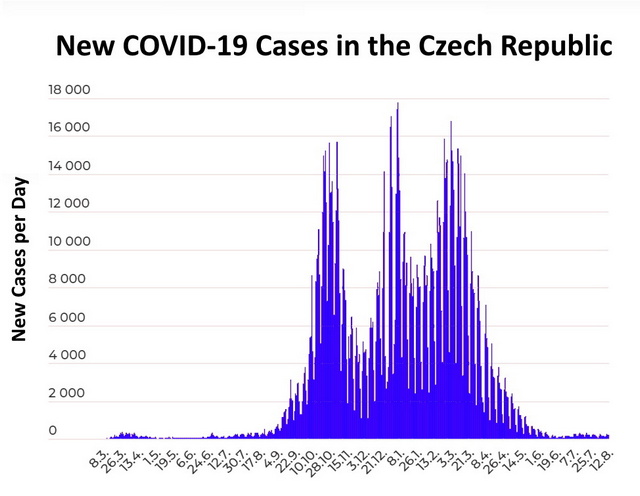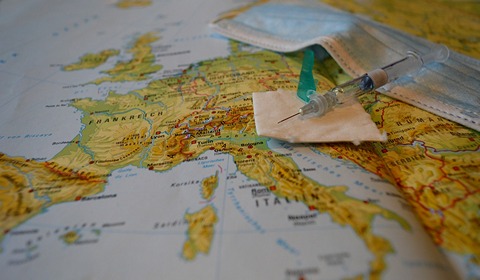Faculty of Electrical Engineering and Communication of the Brno University of Technology in cooperation with the International Society of Electrochemistry would like to invite you to
22nd International Conference
Advanced Batteries, Accumulators and Fuel Cells [ABAF 22]
August 22nd - 25th, 2021
Brno University of Technology
Technická 12, Brno
Czech Republic
COVID-19
When the COVID-19 pandemic started in spring 2020, the Czech Republic was one of the first countries to introduce mandatory wearing of face masks, border closures with the most infected countries and general lockdowns. Thanks to these timely measures, the population was practically untouched by the first wave of COVID-19 and was able to enjoy summer 2020 with minimal restrictions. In early September 2020, we were able to successfully organize the 21st ABAF conference in person without a single case of infection.
In autumn 2020, the Czech Republic became a victim of its own spring success. Czech politicians hesitated to implement restrictions when new cases of COVID-19 began to rapidly increase during September. The combination of lack of immunity in the population (due to a very mild first wave) and insufficient restrictions led the Czech Republic to the highest ranks in COVID-19 infections worldwide. While there were less than 400 new infections per day throughout the first wave (in the country of 10 million people), new infections reached 3,000 per day by the end of September and 15,000 per day by the end of October. The second wave peaked in November 2020 (15,726), the third wave in January 2021 (17,771) and the fourth wave in March 2021 (16,781). On March 1, 2021, the country closed last open schools, most shops and introduced hard regional lockdowns.

After that, the situation began to improve. Vaccinations against COVID-19 were running since January 15 (people aged 80+) and gradually opened to younger age groups. According to estimates, more than 20% of the Czech population contracted COVID-19 during the autumn and winter of 2020. Their immunity, combined with vaccinations and lockdowns, has led to a dramatic drop in new infections, which reached the low levels of last summer in May 2021. The number of new infections dropped from 2,500 per day at the beginning of May to less than 500 at the end of the month.
The lockdowns were lifted and the economy gradually reopened during May without any negative impact on the number of new infections. Vaccinations are open to all age groups since the beginning of June and will continue throughout the summer. We are cautiously optimistic about the evolution of the pandemic in the Czech Republic over the summer. While the new Delta variant has been spreading across Europe since the beginning of July, it has not lead to an increase of infections in the Czech Republic and as of August 1, COVID-19 related restrictions are further loosened.
Based on the developments described above, the forecasts and the guidelines of the relevant health authorities, we have decided to organize this year's conference as usual, with personal participation and author presentations, on the originally planned date of August 22 - 25, 2021, under strict hygiene conditions.

Present COVID-19 Related Restrictions in the Czech Republic
- Conferences / Educational events / Cultural events / Sports events / Concerts:
Only persons without clinical symptoms of COVID-19 who meet one of the conditions of the "Safe Persons" category below are permitted entry. Attendees are required to wear FFP2 type respirators at all times during the event (except when eating, drinking or lecturing). Participants are required to be seated and the maximum number of participants is 3,000 people indoor (but no more than 100% of the total number of seats). - Face masks / Respirators:
People are required to wear FFP2 respirators in shops, restaurants, public transport vehicles, hospitals, airports, universities, cultural objects, at conferences, concerts, educational, cultural and sport events and in general everywhere indoors, where the distance between two people (who are not from the same household) is less than 1.5 meters. - Restaurants / Hotels / Services:
Only persons without clinical symptoms of COVID-19 who meet one of the conditions of the "Safe Persons" category below are allowed to enter restaurants, hotels and other buildings with services. In hotels, this compliance should be verified every 7 days. People are required to wear FFP2 type respirators (except when eating, drinking or being in their own room). - "Safe Persons":
Only people fulfilling one of the following conditions are allowed to enter conferences, educational, cultural and sports events, restaurants, hotels and services:
1. have a negative COVID-19 RT-PCR test, no older than 7 days.
2. have a negative COVID-19 POC antigen test, no older than 72 hours.
3. have a national certificate of being vaccinated with one of the vaccines, accepted in the EU, at least 14 days after the second vaccination (in the case of two dose vaccines).
4. have a national certificate of being vaccinated with one of the vaccines, accepted in the EU, at least 14 days after the vaccination (in the case of one dose vaccines).
5. have confirmation of having contracted COVID-19, been isolated and recovered no more than 180 days ago.

Entry into the Czech Republic from Abroad
As of July 31, citizens of EU+ countries and foreign nationals with permanent or long-term residence in the EU+ are allowed to enter the Czech Republic for any reason. EU countries are divided into several groups according to the risk of COVID-19 infection: "green" (low risk), "orange" (medium risk), "red" (high risk), "dark red" (very high risk) and "black" (extreme risk). Depending on the country of stay in the last 14 days before entering the Czech Republic, people are required to meet several conditions.
All people entering the Czech Republic must fill in the "Public Health Passenger Locator Form" available online at https://plf.uzis.cz/ , which is used to contact them in the event that another passenger in the same plane / bus / train is infectious. The system will send a confirmation e-mail of completing the form to the passenger's e-mail and he/she must be able to show this confirmation when traveling to the Czech Republic.
People, who have spent the last 14 days only in "green" or "orange" countries must meet one of the following conditions:
- have a negative COVID-19 RT-PCR test, not older than 72 hours (before or within 5 days after entering the Czech Republic).
- have a negative COVID-19 POC antigen test, not older than 48 hours (before or within 5 days after entering the Czech Republic).
- have a national certificate or a digital EU certificate of vaccination in an EU+ country with one of the vaccines, accepted in the EU, at least 14 days after the last dose of vaccination.
- have a written medical certificate in English from an EU+ country or a digital EU certificate confirming of having contracted COVID-19, been isolated and recovered not more than 180 days ago.
People, who have spent at least 12 hours in the last 14 days in "red" or "dark red" countries need to fulfill one of the following conditions:
- have a negative COVID-19 RT-PCR test, not older than 72 hours + self-isolate in the Czech Republic for 5 days and receive another RT-PCR test after the 5th day in the Czech Republic.
- have a national certificate or a digital EU certificate of being vaccinated in an EU+ country with one of the vaccines, accepted in the EU, at least 14 days after the last dose of vaccination.
- have a written medical certificate in English from an EU+ country or a digital EU certificate confirming of having contracted COVID-19, been isolated and recovered not more than 180 days ago.
Foreigners, who would spend at least 12 hours in the last 14 days in a "black" country would be allowed to enter the Czech Republic only in very special cases and with some further conditions.

As of August 16, no EU+ country is considered "black". Andorra, Belgium, Canary Islands, Denmark, Estonia, France, Greece, Iceland, Ireland, Lithuania, Malta, Portugal, San Marino, Sweden and the Netherlands are considered "red" and Cyprus, Monaco and Spain are considered "dark red". Austria, Bulgaria, Finland, Italy, Liechtenstein, Luxembourg, Madeira, Norway, Slovenia and Switzerland are considered "orange" and the remaining EU+ countries are considered "green": Croatia, Germany, Hungary, Latvia, Poland, Romania and Slovakia.
Unfortunately, as far as people from outside the EU+ are concerned, only people from a group of countries with a low prevalence of COVID-19 are currently allowed to enter the Czech Republic: Albania, Australia, Bosnia, Brunei, Canada, Hong Kong, Israel, Japan, Jordan, the Republic of Korea, Kosovo, Lebanon, Macao, Montenegro, New Zealand, North Macedonia, Qatar, Saudi Arabia, Serbia, Singapore, Taiwan, USA and Vatican.
This group of non-EU countries, from which entry into the Czech Republic is allowed, is regularly reviewed and expanded on the basis of the COVID-19 situation and recommendations of EU health authorities.












